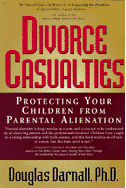Description:
Some parents consciously, blatantly, and even maliciously harm their ex-spouse through negative comments and actions. Others simply sigh or tense up at the mention of the other parent, causing guilt and anxiety in the children. The result is a child full of hate, fear, and rejection toward an unknowing and often undeserving parent.
Divorce Casualties: Protecting Your Children from Parental Alienation is the first-ever guide for divorced parents to help you understand the effects of your actions on your children. Parental alienation – behaviors, whether conscious or unconscious, that could evoke a disturbance in the relationship between a child and the other parent – was first recognized among mental health professionals in the mid-1980s. Not until now has there been a book for you, the parent, to turn to for help.

Protecting Your Children from Parental Alienation
Table of Contents
Acknowledgments
Introduction
A Cautionary Note
Chapter 1: What is Parental Alienation Syndrome?
Chapter 2: How Parental Alienation Affects Children
Chapter 3: Giving Your Children What They Need
Chapter 4: Why Parents Alienate
Chapter 5: How Parents Alienate
Chapter 6: More Alienation Tactics: Secrecy and Spying
Chapter 7: The Importance of Symbolic Communication
Chapter 8: Values and Discipline
Chapter 9: Parenting Time and Children’s Activities
Chapter 10: Health and Safety
Chapter 11: Allegations of Sexual Abuse
Chapter 12: Significant Others
Chapter 13: Working Successfully with Attorneys, Mediators and Counselors
Chapter 14: When All Else Fails: Seeking a Change in Custody
Chapter 15: What Are You To Do?
Appendix
Custody and The Court System
Bibliography
Index
About the Author:
Dougals Darnall, Ph.D., is a licensed psychologist and CEO of PsyCare, an outpatient psychology center in Youngstown, Ohio. He teaches workshops and parental alienation syndrome and divorce to mental health care professionals.




You must be logged in to post a comment.